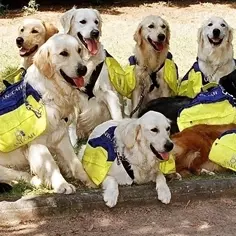
Environment and Biodiversity
Place
Alençon, Orne, France
Grant(s)
96,000 euro to the Selection Committee at 2006/01/31
Project leader
Handi'Chiens
« This project is designed to integrate or reintegrate seriously challenged persons in everyday life and in the working world, by providing them with a “canine tool”. »
Serge Cavelius et Jean-François Onfray
In France, more than one and a half million persons suffer from a motor handicap. To help them overcome the many difficulties that everyday life puts in their path, aid dogs prove to be excellent companions. To the point where, since February 2005, the handicap law recognizes canine assistance as an integral part of therapy. Yet for a dog to be capable of opening a door, pressing a button, picking up an object from the floor, or doing the shopping, two years of intensive education are necessary. An investment of 12 000 euros per animal ready to perform its social role.
The dogs must first be selected, and then sent for “pre-instruction” to volunteer host families (themselves regularly trained for this particular task). They then spend six months with dog instructors who teach them to understand and execute some fifty commands.
The association Handi’Chiens is the only one in France to prepare animals for these missions. Since it was formed in 1991, it has trained 450 dogs and given them free of charge to handicapped persons. It relies on many volunteers and employs a score of persons (mainly dog instructors).
A Growing Workforce
Installed by its founder, Marie-Claude Lebret, in the precincts of the agriculture school in Alençon, where she teaches courses in biology, the association has two buildings where it trains some sixty animals per year. Faced with steadily rising demand, it wants to boost its annual “production” rate by a dozen dogs. The extra cost incurred will go to hiring one more instructor in skilled training. Veolia foundation decided to “sponsor” the training of eight dogs with a gift of 96 000 euros spread over two years. The balance of the necessary funds will be raised from the public at large (sale of t-shirts, participation in regional events, etc.) and by calling for public generosity in the media.

